Interview with Robert Pavlis of GardenMyths.com:
Can Human Food also be Plant Food? (It depends how you apply it.)
(originally aired in Episode 126 of the Garden Basics Podcast)
Farmer Fred: What do you give plants to drink besides water and plant food? This question actually has been asked on many social media outlets, and in many gardening groups. And you might be surprised at the number of household kitchen products that are given to plants. Are they worth it? There is one gentleman who actually tackles a lot of garden myths. He's even written a book on the subject. It's Robert Pavlis. He's a well known speaker-educator, with over 40 years of gardening experience. He's the author of several books including "Building Natural Ponds", "Soil Science for Gardeners", and "Garden Myths". And he publishes the popular gardening blog, gardenmyths.com as well as garden fundamentals.com . He gardens in Ontario, Canada, and Robert Pavlis, it's a pleasure to have you on the program. Tell us, for those of us who aren't familiar with gardening conditions in Ontario, Canada, exactly what your seasons are.
Robert Pavlis: Well, we have a USDA Zone five garden, so we have a fairly long winter. Around here we don't get great snow cover but we do have snow and then we have hail and sleet and everything in between. And then it gets warm and then it gets cold. So even though our winters aren't that cold, the problem here is that we have this freeze-thaw problem. Then spring comes, the summers are quite humid, quite hot. So today is 29 degrees centigrade (84 F). And fall comes pretty quick. And you know, by middle September, while things are finished in the garden by October, we could have frost.
Farmer Fred: So if you're going to grow a summer vegetable garden there, you start around Mother's Day and wrap it up by, I guess, the end of September.
Robert Pavlis: Yeah, well, our traditional last frost date is May 24. That's moved back now to around May 10. So a lot of gardeners up here will try to extend that season. So we use things like rowcovers, or we gamble, what I call gambling in the garden. And I plant things two or three weeks early and hope it doesn't freeze. But that doesn't always work. And we try various other ways to keep things a little warmer. But yeah, early May. Tomatoes and warm season crops, they probably won't go out until late, middle-late May, depending on the year.
Farmer Fred: All right. So a bit shorter than here in California, to say the least.
Robert Pavlis: Just a little bit. Right.
Farmer Fred: All right. Well, I love your GardenMyths.com column that you post, and people can subscribe to it. It's free, and you get email notifications when they are released. And awhile back, you had one on feeding plants from the kitchen, discussing which products actually work. And for those of you who are short of time, the quick answer is, "not many". But I am amazed, though, at what food scraps people are feeding to plants that they think will work. I guess we should start off with discussing exactly how plants absorb nutrients.
Robert Pavlis: Plant roots only absorb certain things. And they have to be what I call small molecules. So nitrogen, potassium, phosphate, these are all small molecules. But what you have in most plants is large molecules, proteins, carbohydrates, and so on. And you can put all that you want on a plant, it can't use it until it decomposes. That's why that composting process is so important. We're taking large molecules, converting them to these small little nutrients that plants can use. And until that happens, plants get no benefit. And they need a certain amount of those, they need a fair amount of nitrogen. They use a fair amount of potassium and phosphate, and then they use about a half a dozen other minor nutrients like calcium, magnesium, manganese, and sulfur. And they need all of those. So one of the things I look at when we're talking about the stuff we're putting on our plants, the first question you really need to ask is, what nutrients are in there? And by the way, the one nutrient that most soil is missing is nitrogen. And I won't get into why, just accept the fact that most of the other nutrients are probably there in the soil. But nitrogen can go away very quickly. It doesn't stick to soil, it runs away. So in most cases, growth is controlled by the amount of nitrogen you give your plants. Now, if you are deficient in one of those other things, you also need to add that one, but nitrogen is a key one. So the key question is how much nitrogen is in what I called food scraps, adding to my plants, and if it's very minor, then it's really not going to do much for your plants.
Farmer Fred: And besides, it has to be converted by the soil biology into a form that the plant can use.
Robert Pavlis: That's right, and nitrogen is used mostly as nitrates and some as urea. But plants pretty much use nitrates. So if I take a big protein molecule, which has lots of nitrogen in it, and I give it to my plant, it's absolutely useless, the plant can't use it. Now, the bacteria in soil may come along and degrade that protein and eventually release the nitrogen. But until the nitrogen is converted into nitrate, plants can't use it.
Farmer Fred: Well, speaking of high protein foods that people like to put on plants for one reason or another, is milk. And this is something that people have been trying for years. Does milk do any good on a plant?
Robert Pavlis: Well, I guess it depends on how you ask the question, right? So milk is mostly water, the second biggest ingredient in clean whole milk is fats. So now there's a tiny, tiny little bit of other stuff there. And some of that is protein, and protein does contain nitrogen. So milk does have a very low level of nitrogen in it. It also has things like calcium and magnesium and some of the other nutrients. So yes, adding milk to plants will provide nutrients to that plant. The question you really need to ask: is that enough nitrogen to actually make my plant grow? Well, and quite honestly, if you have spent milk, you know, you can't drink it. Okay, put it in your garden, put it on some plants, and it will do some good. But milk is an extremely expensive way to get nitrogen. So if you're using good milk that you could drink, I would never put that on the soil. That's just a waste of money.
Farmer Fred: Exactly. It's a very expensive source of nutrients, if you dare. All right. Now, people also want to think that they can get their plants to grow faster if they give them some coffee. And I don't think plants absorb caffeine.
Robert Pavlis: Yeah, this is something that people like to do. So they've finished drinking their coffee, there's a bit left on, it's got to be good for them, let's put it in the plants. So what I did in that blog post is I took a slightly different approach, because so many people are against chemicals, and pro organic. And this concept never makes any sense to me. I'm a chemist, so I understand what's going on here. And coffee is full of all kinds of carcinogens, and I listed them in the blog. And, I said, would you give that to your plants? I mean, would you even drink it yourself? All right. Well, that's the key here. And the thing that people just don't understand is that there's lots of chemicals out there that are toxic, and most of those, in fact, come from plants. Remember, coffee is a plant extract, it is coming from plants. Every plant we eat is full of toxins. The key question is how much of that toxin is in the plant? And what does it do to our bodies, and in most cases, these levels are very low. You don't have to be concerned about them. The chemical names just sound really nasty. They are carcinogens without question, but their levels are low. And the other thing is our bodies have been doing this for millions of years and we're very adapted to eating these toxins as long as they stay in low levels. So coffee doesn't hurt us, and coffee will probably not hurt most plants. However, there's a caveat here. Coffee does have caffeine in it; and, coffee grounds, which are also very popular in the garden. They also have caffeine, and both of them can harm seedlings. So small plants can be given too much caffeine from the coffee grounds if they're used as a mulch. And I guess if you pour too much coffee on you'll get the same effect. So caffeine can kill small plants and it can stunt larger plants, so you have to be careful how much caffeine you put on your plants.
Farmer Fred: That takes us down another scenic bypass. All the people that are going to Starbucks and picking up that five gallon bucket of coffee grounds and taking it back home and putting it around their acid loving plants thinking it will acidify the soil. My concern is they apply those coffee grounds too thickly and it becomes an anaerobic environment.
Robert Pavlis: Yeah. Well, there's a couple myths in this little story. The first thing is coffee grounds are not acidic. So I don't know where that came from. They can be slightly acidic, or they can actually be alkaline. But they're certainly not heavily acidic, they're not going to acidify the soil around your plants. And it's now been shown that a little bit as a mulch is probably okay in your ornamental beds. I would not use it in a vegetable garden where you're planting seeds. Just keep coffee grounds out of there completely. And quite honestly, the best thing you can do with them is compost them first. That will reduce the amount of caffeine and then they'll be fine in the garden.
Farmer Fred: I feel sorry for house plants, especially in offices, especially around party time, just because people tend to dump everything into the house plants on their way out, including things like beer or Gatorade.
Robert Pavlis: Yeah, yeah. By the way, this list came from an actual discussion on Facebook and these are all things that people suggest that I didn't really make out the list. I just went down and recorded it. And yeah, people are pouring good beer on the plants. I don't get that. Again, there's some very minor value there, because again, it has some protein in there. But basically, it's not doing any good for your plants. Gatorade, the reason people use that is because it replaces electrolytes. I mean, Gatorade is good for us, right? It's gotta be good for plants. And that's the logic that people use to get to this point. Well, it doesn't take a lot of effort to Google Gatorade and see what's in it. And the electrolytes is mostly sodium, and potassium. Now plants use potassium. And so that might be helpful. But sodium is toxic to plants. Now, we got to be clear, plants do need a very, very small amount of sodium in their diet. But higher levels are very toxic. Now you're from California, you wouldn't know this. But when it snows everywhere, we tend to put salt on the roads to keep them from freezing up. And so along the road edge, a lot of people have trouble growing plants because all that sodium comes on to those plants. Canadians know that you don't put sodium on plants. But a lot of people think Gatorade is electrolytes. So that's that's got to be good stuff. But it's not. One of those electrolytes is toxic to plants. So don't put Gatorade around your plants.
Farmer Fred: Another ingredient of Gatorade that is also of dubious value when it comes to putting in the garden, although I know nurseries who sell it, is sugar. And, especially in the last drought here in California, there were nurseries selling a product that was mostly sugar, claiming it could mollify the effects of a drought by preserving soil moisture on your lawn.
Robert Pavlis: Yeah, yeah, I've seen those products advertised and I haven't yet done a review on them. But sugar on its own, may help soil a little bit. So plants won't absorb this sugar, it doesn't really do anything for them. Now that may come as a surprise because some people know that plants are “green”. And they photosynthesize. They take sunlight and convert it to sugars. And plants need lots of sugars. That's what makes them grow. But plants don't absorb sugar through their roots. So they want to make the sugar themselves, they don't want to absorb it. So what happens with most of the sugar we put on our soil is that it makes microbes grow. And for microbes, sugars, like candy, they just love it. And they go nuts and they grow like crazy, you get this big explosion of microbes. And that sounds like a great thing. And it may be, but once the sugar runs out, there's a big crash in populations, they all die off. They are all decomposing and indirectly that decomposition of all those microbes will provide some nutrients to the plant. So other things, the potassium and phosphate and magnesium from these dead microbes, are now feeding plants. So indirectly sugar does help plants. But again, it's not the best source. You're better off getting some manure or compost that works just as well and probably works much better because it also includes other things than just sugar. Yeah, sugar is a high carbon material that has no nitrogen in it. And for microbes to decompose high carbon they have to get nitrogen from somewhere and they steal it from the soil, steal it away from plants, to digest that sugar. And so in the short term, it may actually reduce the amount of nitrogen that the plants are getting.
Farmer Fred: In your post at gardenmyths.com on feeding plants from the kitchen: a lot of the substances you mentioned are water-based. There's banana water, there is coffee, of course, fish tank water, pasta water for plants, rice water, even soda pop. And again, probably water is okay, but it's that other stuff that it is probably not going to do much good.
Robert Pavlis: Yeah, I think some of the reason people use this is because they don't want to waste it. Water is now recognized as a precious resource. And so you've got this water in a pot and well, what do I do? I don't want to put it down the drain and waste it, so I'll give it to my plants. And that's probably a valid way to use the water. It's certainly won't hurt the plants. So all those things you mentioned are not going to do a tremendous amount of damage, particularly in a garden where you've got lots of soil and a very small pot of water. If you're doing house plants, see, you might want to give them some variation once in a while. You don't give them all pasta water all the time, but it probably won't harm your plants. The biggest value though, is the water. it's not the other ingredients, the other ingredients are really not doing very much. So the key is you still have to fertilize those plants. Okay? And that's the danger. I think for most beginning gardeners, they say, well, geez, I put some pasta water on there. So I fed my plants. But that doesn't have the nutrients that the plants need. Okay, think of pasta water, and all these other things you mentioned as water, and you still need to put some fertilizer in there.
Farmer Fred: One word of warning. If you do use pasta water on your plants, let it cool off first. Don't put boiling hot water on your plants. Thank you very much.
Robert Pavlis: Yeah, that's a good idea. You'll only do that once though.
Farmer Fred: Yeah, exactly, the results will be quick to see. All right, anything else in this you want to cover?
Robert Pavlis: I think the the overall message I tried to get to gardeners is that except for potted plants, most things in the garden really don't need to be fertilized a lot. I grow about 3000 different varieties and species of plants, everything from trees down to little rock garden plants. And I've been doing this for 15 years in this garden. I have never fertilized anything. I don't fertilize when I plant and I don't fertilize 15 years later, and guess what, stuff grows. Okay. Now if you have a known deficiency, you do have to do something about that. But that applies to a very small percentage of our gardeners, particularly if you're putting on compost and manure and mulching and so on, you're not going to have that deficiency. So you don't have to feed those plants. Now container plants is a different situation. There, we're adding lots of water. We're watering regularly, water pours out the bottom, particularly if they're outside containers. And so we're washing those nutrients out of the soil all the time. And most of time that's not even soil, right? Some soilless stuff that has no nutrients in it, or very few nutrients. So containers, you have to fertilize. Everything else, ignore. Let it grow.
Farmer Fred: Like we say on this program when it comes to fertilizing container plants, fertilize weekly, weakly. In other words, a regular fertilization, but cut the dosage in half every time you fertilize.
Robert Pavlis: Good advice.
Farmer Fred: Robert Pavlis is the author of the gardenmyths.com blog, plus the author of several books, including his best selling "garden myths", book one and Book Two. If you want more information about all his writings, including the books, you can visit his website, gardenmyths.com. Anything else you want me to mention?
Robert Pavlis: I even have a YouTube now. So I'm a YouTuber. So we have a channel called Garden Fundamentals. And there's regular YouTubes on there all about gardening.
Farmer Fred: Robert Pavlis. We've learned a lot this morning. I appreciate your time.
Robert Pavlis: Well, thanks very much. It was fun being here.
Thank you for also listening to the Garden Basics with Farmer Fred podcast! It’s available wherever you get your podcasts. Please share it with your garden friends.
Fred Hoffman is also a University of California Cooperative Extension Master Gardener in Sacramento County. And he likes to ride his bike.

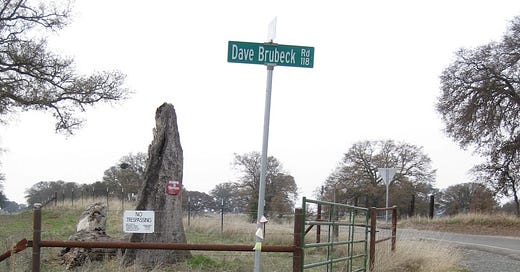







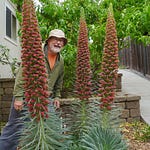

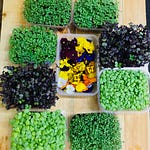
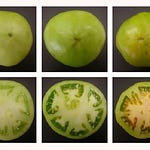

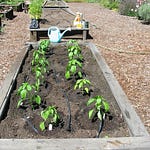
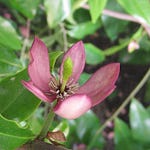
Share this post